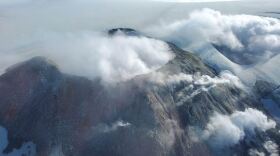Updated 04/27/22 at 12 p.m.
Alaska businesses hurt by the COVID-19 pandemic now have until April 30 to apply for a second round of federal funding.
That’s only for businesses that didn’t get money during the first round of grants issued through the state’s American Rescue Plan Act.
The deadline was originally set for April 15, but the Department of Commerce extended it to 5 p.m. Saturday.
The department also loosened the requirements for eligibility. Originally, applicants had to show they’d lost half or more of their gross revenue from 2019 to 2020 due to the pandemic. Now, if an Alaska-based business lost just 30% or more of their revenue, they are eligible.
Businesses that received money through other programs, like the PPP or through Tribal funding, are still eligible for this round of ARPA grants. And if they qualify, businesses can use their money however they want.
There’s about $34 million dollars left in Alaska’s Rescue Plan pot, from the original $90 million.
Find more informationon the State of Alaska’s website, and more resources atSWAMC.org.
// // //
Original story
Alaska businesses hurt by the COVID-19 pandemic have until April 15 to apply for tens of millions of dollars from a second round of federal pandemic relief funding.
But that’s only if they didn’t get money during the first series of grants issued through the state’s American Rescue Plan Act.
Even if business owners applied and were turned down during that first round of the Alaska ARPA Business Relief Program, they can still give this second round a shot, said Shirley Marquardt, executive director for the Southwest Alaska Municipal Conference.
“If you applied, but you did not get any funding, for whatever reason … you can go back and you can apply again here on round two,” Marquardt said. “And I would really strongly urge people to do that.”
To be eligible, applicants have to show they’ve lost at least half or more of their gross revenue from 2019 to 2020 due to the pandemic.
The state Legislature originally allocated $90 million from the Covid State and Local Fiscal Recovery Funds, which is a part of Alaska’s ARPA funding, to go toward the tourism and business relief grant program. Of that original amount, there’s about $34 million dollars left in the state’s ARPA pot.
Unlike the CARES program, this grant isn’t first-come, first-serve, and all approved applicants will get funding, according to Marquardt.
“You might not get all of the funding you asked for,” she said. “It completely depends on the number of complete, full applications that they've received and reviewed by the cutoff date.”
With about a week left to apply, Marquardt said there’s still plenty of money to go around.
“They have not had anywhere near the applications turned in as they did on the first round last year, where there were tens of thousands,” she said. “Right now, it's in the very low hundreds.”
Marquardt said the pandemic affected Southwest Alaska differently than the rest of the state. Even within the region, she said the economic effects varied.
For example, in Kodiak, she said there are more businesses that rely on tourism and were devastated by the lack of visitors. In Unalaska, the effects were more localized to the fishing industry.
“We're not visitor-based,” Marquardt said. “And we don't have a university system that supports us. We don't have a hospital system that supports us, like Kodiak does. We have fishing. So the impacts to the communities were more so for the processors and the harvesters.”
Only one Unalaska small-boat fisherman applied for the first round of funding, according to Marquardt. She said that was a missed opportunity for the community.
“Any commercial fisherman who owns and operates his own boat, or hers, is completely eligible,” she said. “You just have to be able to show your tax documents that go, ‘Yeah, this is what happened to me in 2020. I lost 50% of my revenue.’”
Businesses who received money through other programs, like the PPP or through Tribal funding, are still eligible for this round of ARPA funding, Marquardt said. And if they qualify, businesses can use their money however they want.
She said there’s no reason not to apply if you’re an Alaska business owner who lost at least half of your revenue and didn’t get funding in that first round.
“It's either a yes or no,” she said. “And if it's a yes, it comes in the form of a check – a very large check – that you can then use to pay off debts.”
Applications are due by 5 p.m. on April 15. Find more information on the State of Alaska’s website, and more resources at SWAMC.org.






